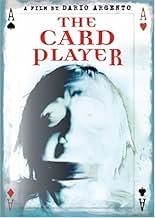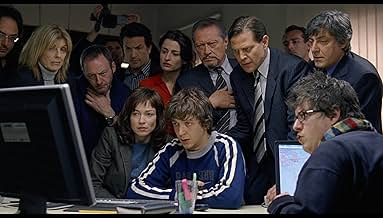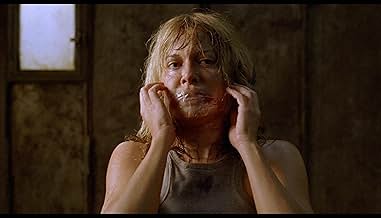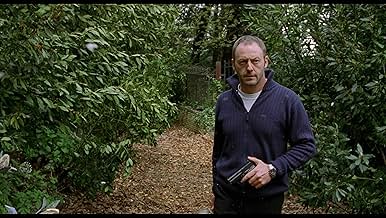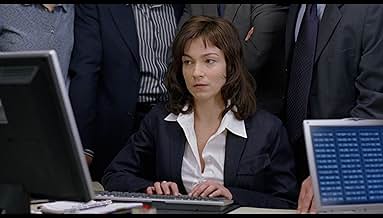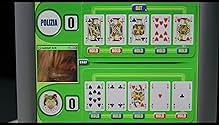CALIFICACIÓN DE IMDb
4.9/10
5.8 k
TU CALIFICACIÓN
Una policía romana y un agente de Interpol británico persiguen a un asesino serial que secuestra mujeres, las mata en webcam y juega con la policía.Una policía romana y un agente de Interpol británico persiguen a un asesino serial que secuestra mujeres, las mata en webcam y juega con la policía.Una policía romana y un agente de Interpol británico persiguen a un asesino serial que secuestra mujeres, las mata en webcam y juega con la policía.
- Dirección
- Guionistas
- Elenco
- Premios
- 1 nominación en total
Pier Maria Cecchini
- Flying Squad Chief
- (as Piermaria Cecchini)
Opiniones destacadas
I was among those who felt that Argento lost his touch after TENEBRAE (1982), and that his output during the last 20 years or so was just a pale shadow of his best work (with the truly lamentable 1998 version of THE PHANTOM OF THE OPERA being the worst of all). While all these films contained some interesting elements, they failed to jell into a satisfying whole; the same, therefore, can be said of his latest offering.
THE CARD PLAYER was originally intended as a sequel to THE STENDHAL SYNDROME (1996), which had starred the director's talented daughter Asia: however, in the interim she had turned her attention to directing small, personal films and at the time of the proposed shooting was staying in the U.S.; so, the lead character's name and background had to be slightly changed to accommodate a new actress Stefania Rocca. Unfortunately, the days when Argento's unique visual style was alone worth the price of admission are long gone and, despite a few distinct touches here and there (with the best sequence being when Rocca is stalked at night by the killer in her own house), THE CARD PLAYER looks and feels distressingly like the typical made-for-TV movie that fills up the tube's schedule in Italy virtually every week (the fact that the film is considerably less gory than his earlier stuff, with the majority of the murders taking place off-screen, or that none of the cast members other than Rocca herself are well-known, let alone overseas, only adds to this impression)! At least, regular collaborators Claudio Simonetti (music score) and Sergio Stivaletti (make-up effects) are on hand to offer their consistently reliable input
Anyway, the cat-and-mouse thriller plot (once one gets over the silly premise that the Police would accept the challenge of a poker game with the killer, even if the prize is the life of a hostage) is intriguing and compelling enough for the most part but characterization is alarmingly shoddy (despite its attempt to create a romantic situation between Rocca and Liam Cunningham, the latter sent by the British Embassy in Rome to investigate the murders), while the eventual revelation and subsequent climax involving a speeding train are quite a disappointment (though, from what little I recall of Argento's later work, at least OPERA [1987] and SLEEPLESS [2001] were also given lame endings)!
THE CARD PLAYER was originally intended as a sequel to THE STENDHAL SYNDROME (1996), which had starred the director's talented daughter Asia: however, in the interim she had turned her attention to directing small, personal films and at the time of the proposed shooting was staying in the U.S.; so, the lead character's name and background had to be slightly changed to accommodate a new actress Stefania Rocca. Unfortunately, the days when Argento's unique visual style was alone worth the price of admission are long gone and, despite a few distinct touches here and there (with the best sequence being when Rocca is stalked at night by the killer in her own house), THE CARD PLAYER looks and feels distressingly like the typical made-for-TV movie that fills up the tube's schedule in Italy virtually every week (the fact that the film is considerably less gory than his earlier stuff, with the majority of the murders taking place off-screen, or that none of the cast members other than Rocca herself are well-known, let alone overseas, only adds to this impression)! At least, regular collaborators Claudio Simonetti (music score) and Sergio Stivaletti (make-up effects) are on hand to offer their consistently reliable input
Anyway, the cat-and-mouse thriller plot (once one gets over the silly premise that the Police would accept the challenge of a poker game with the killer, even if the prize is the life of a hostage) is intriguing and compelling enough for the most part but characterization is alarmingly shoddy (despite its attempt to create a romantic situation between Rocca and Liam Cunningham, the latter sent by the British Embassy in Rome to investigate the murders), while the eventual revelation and subsequent climax involving a speeding train are quite a disappointment (though, from what little I recall of Argento's later work, at least OPERA [1987] and SLEEPLESS [2001] were also given lame endings)!
Of course it's not Dario's best, but it's not his worst. I give it a 5.5, leaning more on the 6 side.
Anna Mari (Taras Kostyuk) is a policewoman working with an Irish policeman (Liam Cunningham) and a young poker champ (Silvio Muccino) to catch a killer who kills his young female victims if the police loose a game of video poker.
This movie seems like an okay mix of "Silence of the Lambs", "Saw 2", and "CSI".
The music, like in all of Darios films, is great. The look of the dead bodies are also fantastic and spooky.
However, Phoebe Scholfield and Jay Benedict (both first time writers) did a horrible job of the dialogue. In fact, I didn't like most of the writing. It was confusing at times but as long as you don't think too deep into it, you can enjoy this as a neat little screaming-and-crying-girl flick with great special effects and so-so kills. They're so-so because most of them are offscreen and similar, but towards the end they get great and unique.
So you could easily enjoy this if you just want to pass the time, but don't expect another Argento classic.
Anna Mari (Taras Kostyuk) is a policewoman working with an Irish policeman (Liam Cunningham) and a young poker champ (Silvio Muccino) to catch a killer who kills his young female victims if the police loose a game of video poker.
This movie seems like an okay mix of "Silence of the Lambs", "Saw 2", and "CSI".
The music, like in all of Darios films, is great. The look of the dead bodies are also fantastic and spooky.
However, Phoebe Scholfield and Jay Benedict (both first time writers) did a horrible job of the dialogue. In fact, I didn't like most of the writing. It was confusing at times but as long as you don't think too deep into it, you can enjoy this as a neat little screaming-and-crying-girl flick with great special effects and so-so kills. They're so-so because most of them are offscreen and similar, but towards the end they get great and unique.
So you could easily enjoy this if you just want to pass the time, but don't expect another Argento classic.
What can I say about this film? It certainly is not a typical Argento film (and I mean that in a very broad sense - there are some things you expect from an Argento film, like gore, tension and a certain visual style), but is it really bad? Well, it's not a terrible movie but from the man that gave us Suspiria, Deep Red and Tenebrae I expected much more.
First of all it's not giallo but more of a run of the mill detective story. Now, this wouldn't be bad if it was a good detective story, but it's not. The identity of the killer was predictable and some parts of the story did not make any sense. On top of that, the acting was not very good and the music was at best tolerable. And the final scene was just bad and did not make much sense.
The only good things about the movie were some great shots of Rome, and a couple of good, powerful scenes (like the first 2 murders) that reminded me a little of Argento's better films.
It's not a very bad movie, it's just a mediocre one. But since it's an Argento movie I expected much more. I give it 5 out of 10.
First of all it's not giallo but more of a run of the mill detective story. Now, this wouldn't be bad if it was a good detective story, but it's not. The identity of the killer was predictable and some parts of the story did not make any sense. On top of that, the acting was not very good and the music was at best tolerable. And the final scene was just bad and did not make much sense.
The only good things about the movie were some great shots of Rome, and a couple of good, powerful scenes (like the first 2 murders) that reminded me a little of Argento's better films.
It's not a very bad movie, it's just a mediocre one. But since it's an Argento movie I expected much more. I give it 5 out of 10.
The Card Player' directed and co-authored by leading Italian filmmaker, Dario Argento is quite different from what I expected, based on Argento'' reputation based on his best known film, the horror classic, 'Suspiria' of about 20 years ago. This movie is much less Wes Craven and much more Alfred Hitchcock, although I think Argento does not quite measure up to the Great Hitchcock in his use of subtlety and surprise, although there are a few good surprises in this film.
While this movie was made by a thoroughly Italian cast and crew, except for Irish actor, Liam Cunningham, almost all the original dialog as we hear it in the film was spoken in English as it was filmed. Mistaking this for a horror film was easy based on the cover art and some of the blurbs on the package. And, these hints are not entirely misleading, as there is a fair amount of intentional horror based on a fairly extended threat of death to a victim seemingly unable to free herself from the situation, unlike Hitchcock's secret threat, suddenly sprung on the unsuspecting victim as in 'Psycho'.
The mechanics and most business of the story are ultramodern. The victims are kidnapped, bound, and gagged (albeit a bit amateurishly), and the prep sends an e-mail to a female police detective that in order to free the Vic, the police will need to have someone play computer poker with the prep, freeing the Vic by winning two out of three hands. The first victim is a British tourist, bringing the Irish detective attached to the UK consulate in Rome into the case. And, this detective happens to be a forensics expert, so a lot of his early investigations are straight out of the 'CSI' casebook. Although, none are so modern that you couldn't see almost the identical business in a movie made 50 years ago, just as you see them in the murder / suicide investigation scene in Fellini's 'La Dolce Vita'.
Not only is the plot much more a thriller than a horror show, but the quality of the acting, directing, and camera work is high as well. Unfortunately, I feel the writing, in the implausibility of many plot turns, is just a bit too weak. While Argento may be one of the best known Italian filmmakers working today, his scripts fall far short of the great plot and dialog of Fellini and Bertolucci.
One of the very first weaknesses is in the way the police failed to play the contact with the prep. Given the chance to bring in an expert poker player to play the hands, that task falls wholly nilly to the female detective who is not only a poor poker player, but has a monkey on her back about gambling and poker, as her father committed suicide after a failure at cards. For the second kidnapping, the police happen upon a detective who knows something about poker, but who fails nonetheless. Only with the third victim do the police enlist the assistance of an expert computer poker player, who succeeds in effecting the release of the victim.
Explaining more implausibilities starts to give away some of the better parts of the plot, so I will stop there and note that this DVD has my very favorite feature, an audio commentary running the entire length of the film. The commentary is by the cinematic author, Alan Jones rather than by the director or his co-author or producer, but it's pretty good. Since, as the commentator notes, Argento does not film in any of the well-known tourist locations (except for a brief glimpse of the Pantheon and a scene in the Tiber), but in the 'real' bourgeois' Rome. So, commentator Jones gives us an orientation for where we are in Rome and on the events which help us understand the plot. He also points out the virtually total absence of blood in the film, which was a conscious decision by the director, since so many of his other films are so singularly bloody.
While this movie was made by a thoroughly Italian cast and crew, except for Irish actor, Liam Cunningham, almost all the original dialog as we hear it in the film was spoken in English as it was filmed. Mistaking this for a horror film was easy based on the cover art and some of the blurbs on the package. And, these hints are not entirely misleading, as there is a fair amount of intentional horror based on a fairly extended threat of death to a victim seemingly unable to free herself from the situation, unlike Hitchcock's secret threat, suddenly sprung on the unsuspecting victim as in 'Psycho'.
The mechanics and most business of the story are ultramodern. The victims are kidnapped, bound, and gagged (albeit a bit amateurishly), and the prep sends an e-mail to a female police detective that in order to free the Vic, the police will need to have someone play computer poker with the prep, freeing the Vic by winning two out of three hands. The first victim is a British tourist, bringing the Irish detective attached to the UK consulate in Rome into the case. And, this detective happens to be a forensics expert, so a lot of his early investigations are straight out of the 'CSI' casebook. Although, none are so modern that you couldn't see almost the identical business in a movie made 50 years ago, just as you see them in the murder / suicide investigation scene in Fellini's 'La Dolce Vita'.
Not only is the plot much more a thriller than a horror show, but the quality of the acting, directing, and camera work is high as well. Unfortunately, I feel the writing, in the implausibility of many plot turns, is just a bit too weak. While Argento may be one of the best known Italian filmmakers working today, his scripts fall far short of the great plot and dialog of Fellini and Bertolucci.
One of the very first weaknesses is in the way the police failed to play the contact with the prep. Given the chance to bring in an expert poker player to play the hands, that task falls wholly nilly to the female detective who is not only a poor poker player, but has a monkey on her back about gambling and poker, as her father committed suicide after a failure at cards. For the second kidnapping, the police happen upon a detective who knows something about poker, but who fails nonetheless. Only with the third victim do the police enlist the assistance of an expert computer poker player, who succeeds in effecting the release of the victim.
Explaining more implausibilities starts to give away some of the better parts of the plot, so I will stop there and note that this DVD has my very favorite feature, an audio commentary running the entire length of the film. The commentary is by the cinematic author, Alan Jones rather than by the director or his co-author or producer, but it's pretty good. Since, as the commentator notes, Argento does not film in any of the well-known tourist locations (except for a brief glimpse of the Pantheon and a scene in the Tiber), but in the 'real' bourgeois' Rome. So, commentator Jones gives us an orientation for where we are in Rome and on the events which help us understand the plot. He also points out the virtually total absence of blood in the film, which was a conscious decision by the director, since so many of his other films are so singularly bloody.
This movie deserves a bit more credit - it is not the best Argento film but it is certainly better than Phantom of the Opera. I think the main complaint that an Argento fan could have about this film is it is very un-Argento - it feels a bit more like a gory Ruth Rendell. However the plot is quite tight, the poker playing serial killer is a new concept that I quite appreciated, the main actress I thought was excellent, she reminded me a lot of Franka Potente. Definitely give this one a watch, its not the usual Argento style but it is still a good thriller. Do not watch this one if you are not a fan of Agatha Christie/Ruth Rendell/Inspector Morse and are expecting Argento's usual slightly bizarre edge - this is a pretty ordinary "detective trying to catch serial killer" flick.
¿Sabías que…?
- TriviaWhen Anna (Stefania Rocco) is attacked in her home, (suddenly) a pair of dismembered fingers are shown; this is left in / over from shots not included the film, first inferred when John (Liam Cunningham) inspects / lifts the first victim corpse's arm in the mortuary, and then to the water recovered victim, which in a short location 'making of' documentary, is shown as also had missing fingers.
- ErroresBoom mic visible at the top when English detective comes and insulting begins.
- Citas
John Brennan: THIS IS FUCKING BOLLOCKS!
- ConexionesReferenced in ¿Te gusta Hitchcock? (2005)
Selecciones populares
Inicia sesión para calificar y agrega a la lista de videos para obtener recomendaciones personalizadas
- How long is The Card Player?Con tecnología de Alexa
Detalles
Taquilla
- Presupuesto
- EUR 2,000,000 (estimado)
- Total a nivel mundial
- USD 3,368,452
- Tiempo de ejecución1 hora 43 minutos
- Color
- Mezcla de sonido
- Relación de aspecto
- 1.85 : 1
Contribuir a esta página
Sugiere una edición o agrega el contenido que falta

Principales brechas de datos
By what name was El amo del juego (2003) officially released in India in English?
Responda


